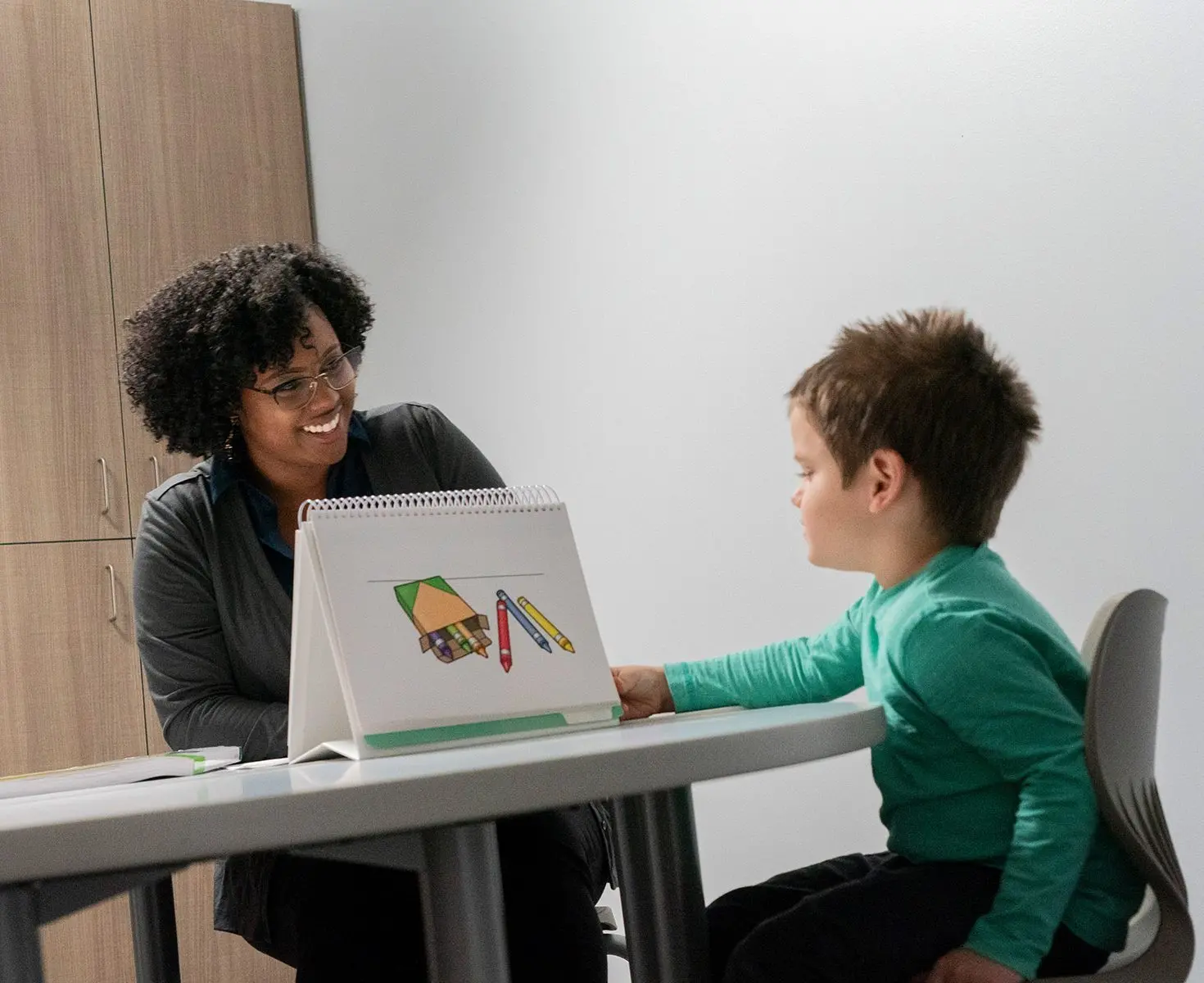What to Expect During Your Visit to a Speech Pathologist
What to Expect During Your Visit to a Speech Pathologist
Blog Article
Just How a Speech Pathologist Can Help Improve Interaction Abilities
Efficient interaction is a cornerstone of personal and professional success, yet lots of individuals encounter challenges that hinder their ability to share themselves plainly. A speech pathologist is furnished to address these barriers via targeted evaluation and treatment strategies tailored to every person's demands. By employing evidence-based restorative methods, they not only function to enhance speech and language disorders but additionally boost total communicative skills. Understanding the multifaceted function of a speech pathologist discloses exactly how their knowledge can transform lives, inviting a better assessment of the specific techniques and end results connected with their practice.
Comprehending Interaction Problems
Comprehending interaction disorders is essential for acknowledging exactly how they affect individuals' capability to express themselves and engage with others. Communication conditions incorporate a variety of troubles that influence speech, language, and social communication, commonly impeding effective communication. These problems can arise from numerous elements, including neurological problems, developmental hold-ups, physical impairments, or mental problems.
Speech problems might show up as problems in voice, articulation, or fluency production, affecting exactly how words are pronounced or talked. Language conditions, on the other hand, include challenges in understanding or utilizing language, which can restrain both non-verbal and verbal interaction. Social interaction disorders are characterized by problems in the pragmatic aspects of interaction, such as taking turns in conversation or understanding social hints.
The effects of interaction conditions are extensive, affecting not only the individual's ability to communicate feelings and ideas yet also their social relationships, educational chances, and general lifestyle. Awareness of these problems can cultivate empathy and assistance, urging efficient strategies for interaction and involvement. Comprehending the complexities of interaction problems is a vital step in the direction of promoting inclusivity and resolving the requirements of those impacted.
Role of a Speech Pathologist
Speech pathologists regularly play a crucial role in dealing with and diagnosing interaction problems, employing a series of evidence-based techniques tailored to every individual's needs. These specialists collaborate with people throughout the lifespan, from children with speech delays to grownups recuperating from strokes or terrible brain injuries. Their know-how encompasses a range of communication concerns, consisting of articulation, voice, language, and fluency disorders.
In healing setups, speech pathologists utilize organized interventions designed to boost communication skills. They might carry out strategies such as speech workouts, language video games, and social interaction training to help with enhancements in expressive and receptive language capacities. Speech Pathologist. Furthermore, they educate customers and their families regarding efficient interaction methods and adaptive techniques to browse everyday communications
Beyond direct treatment, speech pathologists work together with other health care teachers, experts, and caregivers to ensure a detailed strategy to treatment. They support for customers by providing resources and assistance, allowing people to attain their communication objectives and enhance their general high quality of life. As specialists in the area, speech pathologists are important in cultivating reliable interaction, promoting freedom, and improving social involvement for those with communication obstacles.
Analysis and Medical Diagnosis Process
The assessment and diagnosis process performed by speech pathologists usually entails an extensive examination to recognize interaction problems precisely. This procedure begins with a detailed medical history, where the medical professional gathers pertinent details concerning the person's medical, educational, and developing background. Understanding the context of the individual's communication problems is essential for a precise diagnosis.
Complying with the case background, speech pathologists utilize informal evaluations and standardized examinations to evaluate various facets of communication, including speech audio manufacturing, language comprehension, meaningful language, and social communication skills. These assessments are tailored to the person's age and certain worries, giving valuable data for evaluation.
Monitoring is also a crucial element of the evaluation procedure, as it enables the clinician to see firsthand how the individual interacts in all-natural settings. In addition, interviews with member of the family and instructors can give insight right into the person's communication challenges throughout different atmospheres.
As soon as the assessment is complete, the speech pathologist manufactures the findings to establish a medical diagnosis and recommend ideal treatments. This thorough assessment procedure ensures that individuals receive targeted support customized to their distinct communication demands, laying the foundation for reliable healing strategies.
Healing Techniques and Strategies
Numerous therapeutic strategies and techniques are employed by speech pathologists to deal with a range of interaction problems effectively. One extensively used technique is expression therapy, which concentrates on dealing with speech sounds through repetition and visual signs. This method is particularly advantageous for individuals with speech sound problems.
One more reliable technique is language pop over to this web-site intervention, which improves both expressive and receptive language abilities. This may include interactive activities that advertise vocabulary growth, syntax understanding, and conversational abilities. Additionally, speech pathologists commonly use social skills training to enhance practical language capacities, making it possible for individuals to browse social interactions extra successfully.
Fluency shaping and stuttering modification techniques are specifically developed to aid those experiencing fluency disorders. These approaches aid customers establish smoother speech patterns and handle the emotional and physical elements of stuttering.
Additionally, augmentative and different interaction (AAC) systems are utilized for individuals with serious interaction disabilities. These systems, which can include gestures, icons, or electronic gadgets, supply necessary assistance for reliable communication.
Advantages of Speech Treatment

Additionally, speech treatment can assist in establishing important listening and understanding skills, fostering better interaction in conversations. Individuals with cognitive-communication disorders can also benefit, as therapy concentrates on strengthening memory and problem-solving abilities, crucial for effective communication.
An additional vital aspect is the emotional assistance offered throughout treatment sessions. Speech pathologists produce a risk-free setting, motivating individuals to get over stress and anxiety and frustration pertaining to their interaction problems. This support can result in improved self-esteem and overall mental well-being.
Furthermore, early intervention through speech treatment can prevent additional problems, making sure that individuals reach their complete communicative potential. see here now On the whole, the advantages of speech therapy extend past simple speech enhancement, favorably affecting numerous measurements of life for those influenced by communication difficulties.
Conclusion
In recap, speech pathologists play a vital function in addressing communication conditions through evaluation, medical diagnosis, and customized restorative treatments. By utilizing evidence-based techniques, these specialists enhance individuals' speech and language capabilities, fostering boosted clearness, fluency, and social communication abilities. The benefits of early treatment highlight the relevance of looking for support from speech pathologists, as their expertise can substantially improve communicative possibility, ultimately bring about greater success in both expert and personal rounds.
:max_bytes(150000):strip_icc()/speech-pathologist-526069_final-f487a4e98ea448ea823292ded95e32f9.png)
Speech pathologists regularly play a vital role in detecting and treating communication conditions, utilizing a range of evidence-based strategies customized to each person's demands. As professionals in the area, speech pathologists are vital in cultivating efficient interaction, promoting independence, and enhancing social participation for those with interaction obstacles.

Report this page